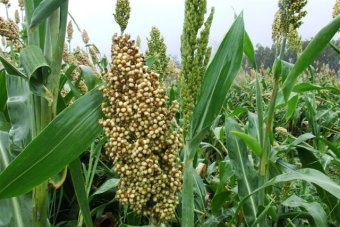
A new agriculture project in the Pilbara will see groundwater discharged from a mine site used to establish a new agriculture crop.
Sorghum crops will be planted on Warrawagine Station in the eastern Pilbara as a part of a 150 hectare pilot project.
The yield is expected to be used for biofuel in the mining industry, as well as for fodder for the station’s 20,000 head of cattle.
Warrawagine pastoralist, Robin Mills, says the crops will be irrigated by groundwater discharged from the nearby Woodie Woodie manganese mine operated by Consolidated Minerals.
He says the water currently goes to waste.
“It flows across the station for about 10 kilometres and then into the Oakover River.
“We’ve grown a one hectare trial project there which has given us some amazing results in the tonnage of sorghum that we can yield off of it….probably three or four cuts a year.
“It’s not just for the pastoralist side but also it could produce a biofuel that could cut Consolidated Minerals overhead costs with the amount of electricity they use and the amount of diesel that they burn.”
Thriving crops
Mr Mills says the sorghum will thrive off the mine’s warm water, which often comes out at a temperature of about 35 degrees.
“When it gets a bit cooler it won’t be growing quite so fast, but the yields in tonnes for the hectare are quite substantial,” he said.
The project is being partly funded under the Government’s $12.5 million Pilbara Hinterland Agricultural Development initiative, which is part of the Royalties for Regions program.
“We’re meeting with government officials Friday next week to set the whole process in motion and discuss what will be provided under that $4-million dollars they’re putting in and how much we’ll be needing to put into it,” Mr Mills said.
“Our aim is to have a crop going in the ground by April next year, which is going to be really pushing because it takes a couple months to get the pivot units from the US, then it will take us a while to get them installed and get the fencing in the ground to block out cattle and camels.
“There’s a lot to be done between now and when we hope to get our first crop in the ground.”
The Warrawagine project has the capacity to expand to several thousand hectares in the future, while a second site for sorghum crops in the central Pilbara is also under consideration.
Pilbara MP, Brendon Grylls, says the project is the kind of industry diversification the mining dependent Pilbara region needs to secure its economic sustainability.

